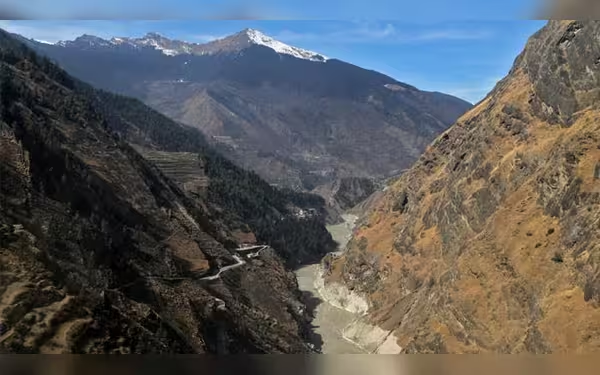Thursday, July 4, 2024 05:38 PM
ICIMOD Urges Immediate Action on Melting Himalayan Snow
- Low snowfall in 2024 raises concerns about water availability
- Himalayas facing adverse effects of climate change, including diminishing snow levels
- ICIMOD warns of potential droughts and advises efficient water resource management
 Image Credits: geo
Image Credits: geoA recent study by ICIMOD highlights the alarming issue of melting snow in the Himalayas, impacting water availability in major river basins. Urgent action is needed to address the diminishing snow levels and potential water scarcity in the region.
A recent study has highlighted the alarming issue of melting snow in the Himalayas, a critical water source for 12 major river basins in the region. The low snowfall in 2024 has raised concerns about water availability, particularly this year. The International Centre for Integrated Mountain Development (ICIMOD) is urging researchers, policymakers, and communities to take immediate action to address this pressing issue.
The Himalayas play a vital role in providing water to millions of people living in the mountains and surrounding river valleys. However, the region is witnessing the adverse effects of climate change, including irregular rainfall patterns and diminishing snow levels. The Hindu Kush and Himalaya region have experienced a significant decrease in snow persistence this year, impacting crucial river basins such as the Ganges, Indus, and Brahmaputra.
ICIMOD, a collaborative organization involving countries like Nepal, Afghanistan, China, and India, has been closely monitoring snow levels for more than two decades. The current snow persistence levels mark the second-lowest in 22 years, signaling a troubling trend. Authorities are being advised to prepare for potential droughts and implement efficient water resource management strategies.
The changing snow levels are leading to shifts in the timing and intensity of stream flows. Regions like the Helmand river basin in Afghanistan and the Indus river basin are experiencing below-average snow persistence, underscoring the urgent need for proactive measures to combat water scarcity. ICIMOD experts emphasize the critical importance of taking proactive steps to mitigate the impact of reduced snowfall on water availability.
The dwindling snow levels in the Himalayas are a cause for concern, as they directly affect water availability in the region. It is imperative for stakeholders at all levels to work together to address this issue promptly. By implementing sustainable water management practices and raising awareness about the importance of preserving this vital resource, we can strive towards a more resilient and water-secure future for the Himalayan region.













